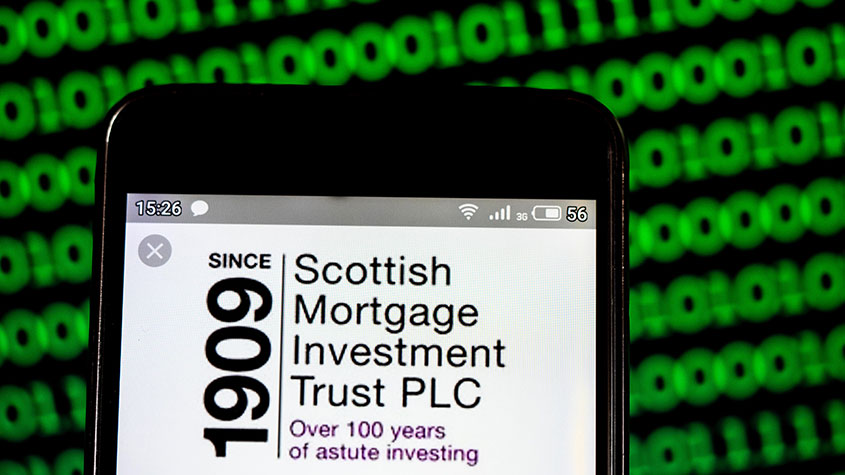Four stocks for 2026
As the year draws to an end, investment experts suggest four stocks that investors may want to keep an eye on for 2026


Get the latest financial news, insights and expert analysis from our award-winning MoneyWeek team, to help you understand what really matters when it comes to your finances.
You are now subscribed
Your newsletter sign-up was successful
Want to add more newsletters?

Twice daily
MoneyWeek
Get the latest financial news, insights and expert analysis from our award-winning MoneyWeek team, to help you understand what really matters when it comes to your finances.

Four times a week
Look After My Bills
Sign up to our free money-saving newsletter, filled with the latest news and expert advice to help you find the best tips and deals for managing your bills. Start saving today!
A new year is approaching and, if it is anything like 2025, it promises to be an eventful one for the stock market.
It’s difficult to know which stocks will come out on top in 2026. We’ve recently looked back at the most popular stocks of 2025 (as well as the top funds of the year), and have heard from various experts on where to invest for 2026.
The consensus seems to be that UK stocks and emerging markets (EMs) could be set to outperform.
MoneyWeek
Subscribe to MoneyWeek today and get your first six magazine issues absolutely FREE

Sign up to Money Morning
Don't miss the latest investment and personal finances news, market analysis, plus money-saving tips with our free twice-daily newsletter
Don't miss the latest investment and personal finances news, market analysis, plus money-saving tips with our free twice-daily newsletter
“The FTSE 100 is ending 2025 near record highs and dividends and share buybacks are neatly supplementing the capital gains,” said Russ Mould, investment director at AJ Bell. “As we enter 2026, the UK market may still feature stocks that could appeal to a wide range of investment strategies and risk appetites.”
Meanwhile, Chris Tennant, co-portfolio manager of Fidelity Emerging Markets Limited (LON:FEML) says: “The outlook for EM today appears positive. The valuation backdrop is favourable, with EM trading at a multi-decade discount to the US even after the recent rally.”
That said, it would be a brave investor who wrote off the potential of AI stocks to keep leading gains, even as concerns of an AI bubble mount.
We’ve sought out investing experts’ top stock picks, and here are their highlights for the new year.
A small cap stock for 2026
Simon Barnard, portfolio manager of the small cap-focused Smithson Investment Trust (LON:SSON), picks out Oddity Tech (NASDAQ:ODD) as his favourite small cap pick for investors to watch in 2026.
Oddity is a US-listed company designing and selling cosmetics and skincare direct to consumers online, but its differentiator is its use of machine learning alongside its database of 2 billion consumer data points to successfully match customers to their most suitable products.
“Despite revenues growing by 155% and profits by 320% over the last three years, profit growth will be less spectacular in 2025 owing to product and marketing investments for the recent launch of its new prescription skincare brand, Methodiq,” says Barnard.
That drop has seen Oddity’s stock derated (shares fell steeply in August and are almost flat for the year to 16 December), but Barnard expects earnings growth to improve to around 20% annually once the recent investments subside.
A UK stock for 2026
Mould, at AJ Bell, picks out Telecom Plus (LON:TEP), which provides energy, mobile, insurance and broadband services to more than 1.4 million customers, as a balanced UK stock for 2026.
“A share price chart that goes from the top left-hand corner of the screen straight down to the bottom right is not a pretty sight, and shares in Telecom Plus are no higher now than seven years ago, after a fall of more than 30% in the past six months,” says Mould.
“Yet this fall could represent an opportunity to tuck away a stock with a strong long-term record of growing its customer base, profits and dividends.”
But Mould highlights that management stuck to its full-year guidance despite a fall in first-half profits, with CEO Stuart Burnett attributing the declines to timing issues.
“An increase in the interim dividend spoke of management’s faith in the outlook, and Telecom Plus can point to dividend payments worth 922p a share in the past decade,” said Mould. “Potential for further growth in customers, as they shop around for better deals, and cross-selling underpin the long-term outlook and this could help the shares if Telecom Plus convinces the doubters and delivers on its full-year profit outlook next spring.”
With forward P/E multiples of around 12 and 11 for the next two fiscal years respectively as well as a forward dividend yield of 7%, Mould believes Telecom Plus provides “the right mix of upside potential and downside protection”.
Mould also picked out FTSE 100 pharmaceutical giant GSK (LON:GSK) as a cautious UK stock, alongside housebuilder Bellway (LON:BWY) as an adventurous option for investors willing to take more risk.
An EM stock for 2026
Tennant, at Fidelity Emerging Markets Limited, picked Brazilian gold miner Aura Minerals (NASDAQ:AUGO) as his favourite EM stock of 2026.
Aura’s stock has doubled in price this year as gold prices have surged, but is still trading at just nine times projected earnings.
“At current production levels, the company can generate a free cash flow yield of over 20% at gold prices as low as $3k/oz, well below today’s spot levels,” says Tennant. “Capex levels are also high, although this can be funded out of cash whilst still maintaining a generous dividend, and production stands to double once the current project pipeline is complete.”
An income stock for 2026
Mould’s pick for income-focused investors is Lancashire Holdings (LON:LRE). Lancashire is known for underwriting in its specialist areas of insuring (and reinsuring) across aviation, property, marine and energy.
“Between 2008 and the first half of 2025, it has paid out more than 900p a share in ordinary and special dividends, a figure which catches the eye in relation to the current share price [614p as of 16 December],” says Mould.
“Some investors will shy away from catastrophe insurance and reinsurance, as they look at climate change and fear the worst,” Mould continued. “But Lancashire’s exposure to this year’s California wildfires proved more than manageable, and within the limits modelled by its underwriters for such terrible events, and the 2025 storm season has been relatively quiet, even allowing for the awful treatment handed out to Jamaica by Hurricane Melissa.”
Shares currently trade at approximately 1.3 times book value, which Mould says “does not look like a lofty multiplier for a business with Lancashire’s long-term returns profile”.
Get the latest financial news, insights and expert analysis from our award-winning MoneyWeek team, to help you understand what really matters when it comes to your finances.

Dan is a financial journalist who, prior to joining MoneyWeek, spent five years writing for OPTO, an investment magazine focused on growth and technology stocks, ETFs and thematic investing.
Before becoming a writer, Dan spent six years working in talent acquisition in the tech sector, including for credit scoring start-up ClearScore where he first developed an interest in personal finance.
Dan studied Social Anthropology and Management at Sidney Sussex College and the Judge Business School, Cambridge University. Outside finance, he also enjoys travel writing, and has edited two published travel books.
-
 Average UK house price reaches £300,000 for first time, Halifax says
Average UK house price reaches £300,000 for first time, Halifax saysWhile the average house price has topped £300k, regional disparities still remain, Halifax finds.
-
 Barings Emerging Europe trust bounces back from Russia woes
Barings Emerging Europe trust bounces back from Russia woesBarings Emerging Europe trust has added the Middle East and Africa to its mandate, delivering a strong recovery, says Max King
-
 Europe’s new single stock market is no panacea
Europe’s new single stock market is no panaceaOpinion It is hard to see how a single European stock exchange will fix anything. Friedrich Merz is trying his hand at a failed strategy, says Matthew Lynn
-
 Bitcoin 'has become the reserve asset of the internet'
Bitcoin 'has become the reserve asset of the internet'Opinion The cryptocurrency has established itself as the electronic version of gold, says ByteTree’s Charlie Morris
-
 London Stock Exchange exodus: which companies could be next to go?
London Stock Exchange exodus: which companies could be next to go?As many companies exit London, the steady trickle of stocks listing elsewhere could turn into a stampede. Who will be next, and what does this mean for investors?
-
 Is the London Stock Exchange in peril?
Is the London Stock Exchange in peril?More than 150 companies have left the London Stock Exchange or moved their primary listing since the start of 2024. What does it mean for investors and the economy?
-
 Shein prepares for London Stock Exchange listing
Shein prepares for London Stock Exchange listingShein plans for a London Stock Exchange listing after facing hurdles in New York. It’s in a race against time. Matthew Partridge reports
-
 Retail bond paying 8.25% launches – should you buy it?
Retail bond paying 8.25% launches – should you buy it?A new bond from alternative property lender LendInvest looks eye-catching but how do retail bonds work, and what are the risks?
-
 Seize this opportunity to scoop up superior-quality growth stocks
Seize this opportunity to scoop up superior-quality growth stocksTips A professional investor tells us where they'd invest today.
-
 It’s fallen hard – but is now the time to buy Scottish Mortgage Investment Trust?
It’s fallen hard – but is now the time to buy Scottish Mortgage Investment Trust?Tips Shares in the Scottish Mortgage Investment Trust have plunged 45% since the beginning of 2022. We take a look at the trust's performance and discuss what's next for the business.